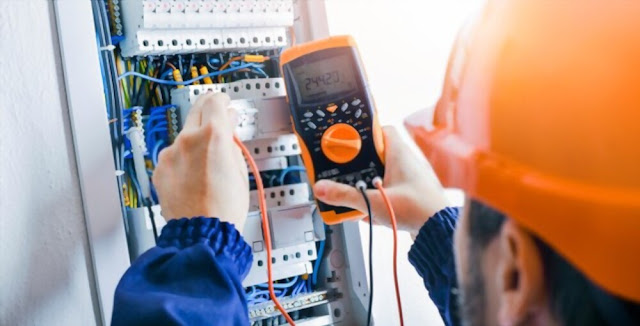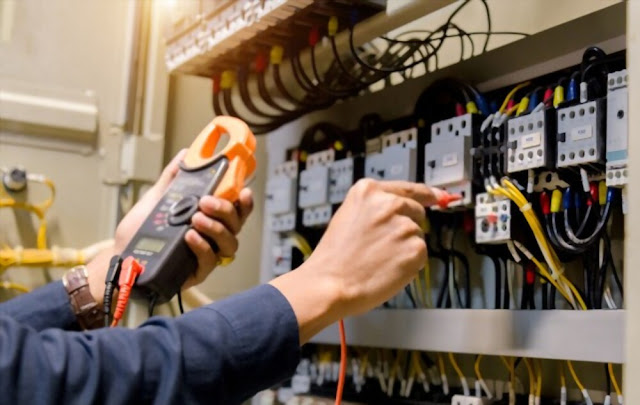How Electricians Ensure Electrical Safety in Your Home or Business
Electricians are constantly working to ensure electrical safety in your home or business. These professionals read blueprints, use hand and power tools, inspect electrical components, and troubleshoot issues.
They are also responsible for maintaining a safe workplace.
This means keeping employees away from potential hazards such as exposed wires.
Local Electrician
Local
electrician ensure electrical safety in homes and businesses by following
specific safety guidelines and procedures. Some of these include using the
proper wire size, making sure that outlets and circuit breakers are not tripped
or overloaded, and keeping electrical appliances safe from young children.
A skilled electrician can handle a wide variety of
residential and commercial electrical work, including wiring and installation
of fixtures, power outlets, and lights. They can also help identify and fix
issues with existing wiring and systems that may be contributing to higher
energy bills or excess usage.
They also have the knowledge and experience to safely
install new wiring or replace old appliances that are not up to code, as well
as recommend and install smoke detectors, AFCI protection, and other important
safety features.
Whether they are working on a commercial or residential
property, electricians take the same precautions to ensure their own safety as
well as the safety of any people that may be affected by their work. Some of
the risks they must be aware of include using a power drill or other tools with
bare metal in an electrically active area, and coming into contact with live
wires.
In addition to these general practices, electricians must
follow local and state electrical codes to ensure their work meets health and
safety regulations. They should also have the appropriate certifications and
credentials to do their job safely and effectively.
Another thing to keep in mind is that electricity is not a
natural substance and it can be very dangerous to come into contact with. This
is especially true if the person is not properly trained or experienced in
dealing with electricity.
The dangers can be even greater if the person is coming into
contact with an older electrical system. These old systems are more likely to
have deteriorated rubber coatings on the wires, which can lead to burns or even
fires if touched by a human being.
Commercial Electrician
Whether you’re working on a new home or a commercial
building, electrical safety is of the utmost importance. An experienced
electrician can ensure your home or business is safe and up to code by ensuring
electrical outlets, circuit breakers and other electrical components are
working properly and that all wiring is in good condition.
In addition to ensuring that your commercial electrical system meets safety codes, an electrician can perform regular maintenance to enhance its lifespan and reduce the risk of failure. This can save you from costly repairs and equipment replacements, while enhancing your overall energy efficiency and sustainability.
Fuse Testing
A fuse is a safety device that cuts off the flow of
electricity when too much flows through a circuit. It works by melting a metal
strip inside the fuse to abruptly cut off the current’s path. Fuses are
essential for preventing dangerous fires, electric shocks and other electrical
hazards in your facility.
If you need to replace a fuse, call your commercial
electrician to have it replaced correctly. They can check for any underlying
issues that caused it to blow and recommend ways to replace it with a safer
model.
Switchboard
Inspection and Testing
The switchboard is an integral part of a commercial
facility’s electrical system. It’s the point of contact for electrical
equipment like lights, heating and cooling systems, HVAC units and security
systems. It’s critical to have a qualified electrician inspect your switchboard
on a regular basis to detect and eliminate any potential issues that could
cause equipment failure or other hazards.
Having your switchboard tested and maintained by a skilled
electrician can help minimize any failures and increase its lifespan, saving
you money on equipment replacements and repair costs in the future. Infrared
thermal scanning can also be used to identify areas of heat gain that may
indicate faulty wiring or other issues.
Industrial Electrician
Electricians ensure electrical safety in your home or
business by installing, testing, and maintaining systems that power appliances,
machines, and equipment. They also perform emergency repairs to keep your
devices running smoothly.
Industrial electricians focus on large-scale projects and
complex electrical systems, working in industries like industrial and
construction sites, or a variety of manufacturing businesses. Their work
requires a high level of skill and safety awareness, as they frequently work in
environments where heavy machinery and other equipment can cause electrical
faults that can lead to downtime or accidents.
They use diagnostic tools to identify and resolve issues
before they cause more damage, and they need an in-depth understanding of the
electrical system to repair them quickly. They also have to maintain safety
records and document logs for any repairs they make to their company’s
machines.
Unlike commercial electricians, industrial electricians
typically work in high-risk areas like factories, plants and warehouses. They
have to be able to get into and around these spaces, which can be physically
demanding because they are often located in tight corners.
These types of environments also involve working in extreme
weather conditions, so they need to be able to deal with cold and heat. They
also have to be able to work safely in high-traffic areas where there is a lot
of noise.
One of the most important things an industrial electrician
does to ensure electrical safety is make sure all machines are properly wired.
This includes making sure that all outlets are up to code and have the
appropriate wattage. They also check that all plugs and sockets are insulated,
which prevents them from melting or causing fires.
Another way industrial electricians ensure electrical safety
is by identifying and implementing best practices. This can include using the
right safety equipment and tools, running cable wires safely, and following
industry standards for safety procedures.
Taking time to implement these practices can save you and
your employees from unnecessary injuries and downtime. It can also protect your
customers and clients, who might be at risk if their electronics aren’t up to
code.
Residential Electrician
Electrical systems are essential in every home and business,
but they can be dangerous when they are not functioning properly. This is why
you should hire an electrician to inspect your wiring and make any repairs if
necessary.
In addition, you should check your outlets regularly to
ensure they are not faulty or outdated. Older wiring is a major cause of fires
and can be dangerous to anyone who touches it, especially young children.
A residential
electrician installs, repairs and updates wiring, circuit boards,
lighting and power outlets in private homes such as single-family houses,
condos and townhomes. They also install electrical components like
transformers, receptacles and lighting in commercial buildings such as office
parks, schools, hotels or resorts, retail stores and industrial facilities.
They use tools such as voltmeters, ammeters, wire strippers,
drills and screwdrivers to install new wiring and appliances. They also replace
fuses and circuit breakers that are no longer in good working order.
It’s important to note that the work of an electrician can
be physically demanding, especially if they have to climb a ladder. They must
also wear safety gear and eyeglasses to prevent shocks or burns from stray
electricity.
The job of a residential electrician can also be stressful
as they often work directly with homeowners. They need to be comfortable with
people living in their work area and make sure to respect the owners’ personal
property while they complete installations and repair jobs.
In addition, residential electricians must be licensed by
their state to ensure they are qualified to perform their duties. This means
that they are required to pass a test before they can start work. They must
also follow local building codes and standards to ensure they are following
proper safety practices.




Comments
Post a Comment